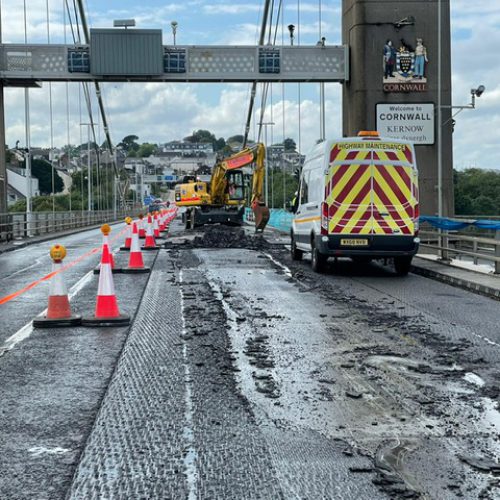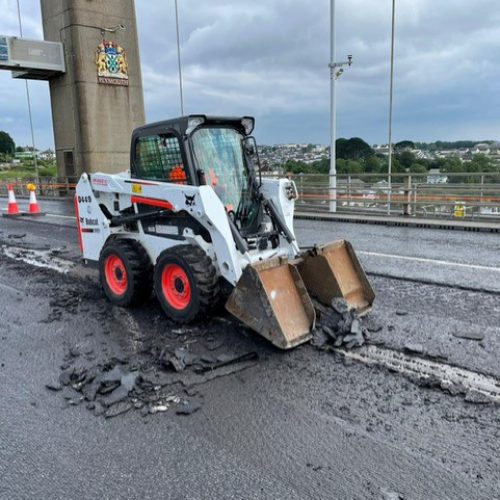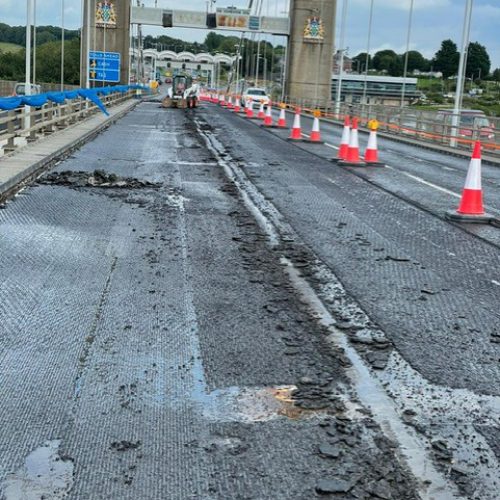The second week of the main deck resurfacing phase has seen work continuing on preparing the steel deck to accept the first waterproofing membranes. VolkerLaser staff are currently using the wheeled excavator (‘rubber duck’) machine to scrape the deck to remove remaining material at the kerb interfaces.
Once this has been completed a specialist blasting contractor will remove the last 8-10mm of deck material with an enclosed shot blasting system. This provides a clean surface so engineers can inspect the steel deck and welds for cracks or damage.
As both processes involve the use of heavy machinery, they generate a considerable amount of noise which would be very intrusive for people living close to either end of the bridge if they were carried out late into the evenings and overnight.
We are very aware of the impact of the works on local residents and businesses, as well as those visiting Cornwall this summer, and are working hard to ensure that the project is completed as quickly and safely as possible. While we have experienced a few showers during the past few days, the weather has largely been on our side, enabling VolkerLaser to remain on schedule to complete the resurfacing on the north side of the main deck by the end of August and the entire scheme by the end of October.
We recognise the significant challenges faced by many travellers using the bridge and surrounding roads over the weekend and are very sorry for any inconvenience this caused. We understand the concerns which have been expressed about the timing of the works during the summer period, but it is essential that the scheme takes place this year.
We are continuing to work closely with partners to improve the process for changing lane priorities to manage the build-up of traffic. Our control room staff are monitoring traffic flows on the bridge and surrounding roads around the clock so we can respond as quickly as possible to any specific issues which arise.
During the past few days we have completed up to 13 tidal changes each day, allowing us to minimise the build-up of queues in any particular direction and to promote dedicated north cantilever access for local Saltash drivers. Drivers have also become more accustomed to the new traffic layouts, helping to increase the capacity of the tidal flow corridor. The toll plaza is also continuing to perform well, with minimal waiting times and all available booth lanes open during busy periods.
While there are still periods when people are facing longer than usual delays, particularly at peak times in the mornings and evenings, the latest data shows improving journey times, with average delays of between 10 and 15 minutes for the majority of drivers.
One of the questions we have been asked by many people is why the project had to be carried out during this summer when Cornwall is so busy.
The simple answer is that the existing surface, which is more than 20 years old, is nearing the end of its serviceable life and needs to be replaced to ensure the safety of people using the bridge.
The resurfacing project has been in the planning stage since 2019 and was originally due to be carried out during 2020. Unfortunately it had to be postponed until this year because of the coronavirus pandemic and the need to complete the kerb replacement works before resurfacing.
While we recognised that this summer was likely to be extremely busy because of the impact of the Covid restrictions on overseas travel, delaying the project again could result in further damage to surfacing material, leading to cracks which then enables water to penetrate onto the steel plates underneath with the potential for corrosion to occur.
A large proportion of the resurfacing work can only be carried out during fine, dry, and mild weather conditions and so could not be left until later in the year when temperatures generally decline and rainfall increases.
Stopping the work for 6 weeks in the summer would cause an unacceptable delay to the project and push the completion of the works into November or December, increasing the risk of delays caused by poor weather, as well as potentially compromising the quality of the finished product.
We appreciate that this is an extremely difficult period for people using the bridge and those living and working in adjoining communities. The Tamar Bridge is a vital transport link between Cornwall and Devon and we are continuing to work with our contractor and partners to deliver the resurfacing project safely, efficiently and with as little disruption to bridge users as possible..
We are continuing to provide regular updates on the project on the social media channels, and providing details to motoring organisations and the local media. This includes real time information of any traffic congestion or delays which are also displayed on electronic messaging signs on the A38.



